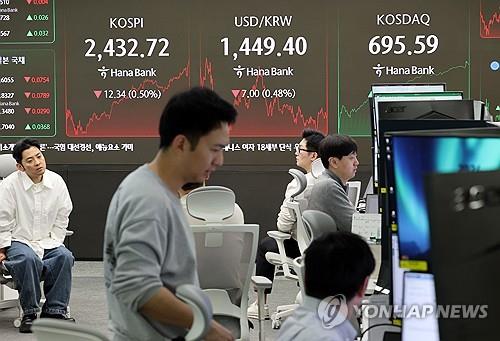- California Assembly OKs highest minimum wage in nation
- S. Korea unveils first graphic cigarette warnings
- US joins with South Korea, Japan in bid to deter North Korea
- LPGA golfer Chun In-gee finally back in action
- S. Korea won’t be top seed in final World Cup qualification round
- US men’s soccer misses 2nd straight Olympics
- US back on track in qualifying with 4-0 win over Guatemala
- High-intensity workout injuries spawn cottage industry
- CDC expands range of Zika mosquitoes into parts of Northeast
- Who knew? ‘The Walking Dead’ is helping families connect
Korean currency volatility hits record high amid Trump tariff shock wave
Volatility in South Korea’s foreign exchange market surged to its highest level last week since the country extended trading hours for the won–U.S. dollar market, data showed Sunday.
The weekly fluctuation in the won–dollar exchange rate reached 67.6 won during the second week of April, which marked the highest level since July 2024, when Seoul expanded FX trading hours from a 3:30 p.m. close to 9 a.m.–2 a.m. the following day.
When compared to records prior to the extended trading hours, last week’s fluctuation was the largest since the second week of November 2022, when the weekly fluctuation reached 101 won.
The Korean won was quoted at 1,421 against the U.S. dollar in after-hours trading Friday, up 40 won from a week earlier. It marked the strongest level since Dec. 5.
The local currency dipped well below the 1,450-won level and has fluctuated near the mark since December amid heightened uncertainty stemming from U.S. tariff threats and a domestic political crisis triggered by then President Yoon Suk Yeol’s shocking imposition of martial law.

The recent market volatility was driven by U.S. President Donald Trump’s decision to pause the implementation of “reciprocal” tariffs for 90 days while applying a baseline 10 percent tariff on imports from South Korea and other countries.
But Washington raised tariffs on Chinese goods to 125 percent following Beijing’s retaliatory measures, fueling concerns over an escalating global trade war and its impact on South Korea’s export-driven economy and the global economy.
The on-hold decision was announced shortly after reciprocal tariffs went into effect, with dozens of countries striving to negotiate deals over new levies. Last week, the Trump administration unveiled 25 percent tariffs on South Korea, 24 percent on Japan and 20 percent on the European Union, among others.
The local stock market also experienced a roller-coaster ride.
The average intraday volatility of the benchmark Korea Composite Stock Price Index (KOSPI) stood at 1.97 percent for April through Friday, marking the highest monthly average since February 2021, according to the Korea Exchange (KRX).











